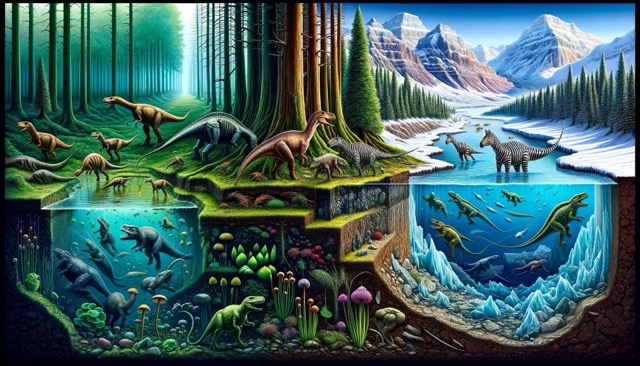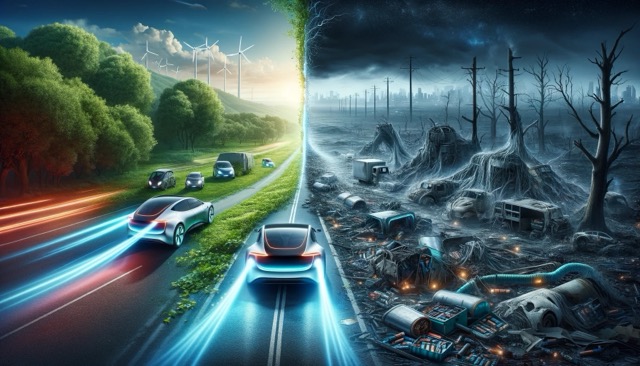The older I get, the more I enjoy warmth. The world has been talking about global warming for many years, so in principle, I could be happy that with increasing age, I will experience higher temperatures and won't be cold. But instead of looking forward to a pleasant old age in warmth, someone is always trying to scare me that this heat will cause a global catastrophe if we do not immediately reduce carbon dioxide emissions... Well, I am not an expert in this area, and the predictions of a disaster for our civilization as we know it could well be realistic, just the obsession with carbon emissions and the belief that reducing them will save us doesn't sit right with me. Climate changes have been occurring on our planet since the moment of its creation and will end with its demise. There have been numerous periods when life in its current form could not have existed, and surely the current favorable conditions will end one day, leading to changes that will force the current fauna and flora to undergo radical transformation or completely annihilate them - it's all just a matter of time, and to think that we can stop these processes by switching from gasoline cars to electric vehicles seems like a naive notion.
I certainly do not want to deny the impact of human activities on the current state of our planet, perhaps on the contrary - many of the things we do harm many organisms, including ourselves, and if we do not deal with the consequences of our actions, we will cause great damage. And perhaps that is also why our current fascination with carbon worries me, thanks to which we sometimes try to change some things crazily, and in these efforts, we may ultimately cause more harm than the carbon itself would, and at the same time, in our unbalanced focus in one direction, we neglect a lot of other things that we should address instead of waging total war on carbon. Again, I repeat, I am not an expert on the atmosphere and the Earth's climate, nor am I a natural scientist. But from what I have read, we currently have a concentration of about 400 ppm of carbon dioxide in the atmosphere, that is, 0.04%. In the times of dinosaurs, horsetails, and lycophytes, this concentration was about twice as high, that is, 800 ppm or 0.08%, while the average temperatures on Earth were not significantly higher than they are today. Yes, the world back then looked different, there were no humans, but fauna and flora thrived quite well and as a result, they also absorbed a significant portion of the carbon concentration in the atmosphere into their bodies, which were buried underground, and today, thanks to that, we heat with coal and oil products. From my limited logic then follows that even if we burned all the coal and oil, the concentration of carbon dioxide would not significantly exceed the values that prevailed here in the times of the dinosaurs.

Taking into account the above, I think that perhaps carbon is not our biggest enemy, but still, I agree that we do not necessarily have to burn everything and I have nothing against reasonable and safe efforts to limit emissions associated with the use of fossil fuels. However, I believe that we should approach efforts to reduce the consumption of coal and oil with caution and in the broader context of the impacts of all such efforts. If in some parts of the world we aim to replace combustion cars with electric vehicles "overnight," which, given the current state of technology, are perhaps not yet mature enough, their batteries weighing hundreds of kilograms contain heavy metals or other toxic chemicals and due to their high weight, significantly wear out tires more, we may ultimately cause more harm than good. Moreover, it does not seem right to me if car manufacturers produce three-ton electric SUVs and huge heavy sedans capable of driving more than 500 km on a single charge instead of small light electric vehicles for urban use, which we could produce four times as many with the same battery capacity, get them among people at a reasonable price, and really help at least improve living conditions in the centers of large cities. I even think it would be better than the current state if, instead of making larger cars, we produced enough small and light cars even with combustion engines, but those that are economical and relatively clean, with which we could replace older cars that had significantly higher consumption and thus also emissions, while also being less safe. However, the current trend is such that small (and inexpensive) cars have essentially disappeared from car manufacturers' production because, due to various regulations and standards, they have become so expensive that those who can afford them prefer to pay more for larger cars. But by making small and inexpensive cars inaccessible, we are causing the aging of the vehicle fleet, since many people simply cannot afford new, more ecological, and at the same time safer cars. If in time too high sanctions in the form of taxes and fees associated with the operation of these older combustion-engine cars are imposed and force most of their owners to take them out of service, we will find ourselves in a situation where many people will not be able to afford the luxury of owning a car and therefore will use public transport or transportation services more - this could also help us reduce the consumption of fossil fuels (and maybe it is even part of the non-public plans of the governments of some countries :-), but it will obviously have a negative impact on the economy of countries whose current prosperity more or less depends on car production.
Let's return, however, to other aspects associated with the effort to decarbonize transportation. Every electric vehicle needs to draw power from somewhere, and currently, this energy is still generated by burning fossil fuels, while electricity today powers practically everything around us - the key question for the future, of course, is how we will obtain electrical energy. Here, as humanity, we have once again plunged headfirst into building large photovoltaic parks, which often take up even valuable fertile land, but for their owners, it was currently more advantageous to cover it with gray shiny panels that will produce energy for some time, but over time will turn into an environmental problem. And since the production of energy from solar panels is highly dependent on the time of day and weather, we necessarily have to create some additional capacities to cover the need for energy when the sun isn't shining - these capacities in many cases still burn fossil fuels or are based on batteries, which are not only expensive but also ecologically problematic in the future… and not just in the future - their mass production also entails a significant burden. Have we chosen the right path to reduce the consumption of fossil fuels, or have we again gone into a somewhat immature solution, which in the long term will cause more harm than good?
Even though my common sense leans towards the opinion that climate changes would probably occur without human influence, simply as part of the natural cycles happening on our planet, I am certainly willing to agree that we are also capable of contributing to the speed of these changes to some extent. However, I have the impression that the emissions of carbon dioxide from the combustion engines of personal vehicles, which some interest groups have targeted, constitute only a very small component with a limited overall impact on what is happening. Global freight transport is likely a bigger source of emissions, but no one has the power or courage for its radical change because it's somewhat a tougher nut to crack. Efforts to limit emissions from electricity production have been touched upon in the previous paragraph; there are some attempts happening, but in some "green" countries, they are significantly thwarted by opponents of nuclear energy, thanks to whom the consumption of coal and natural gas has even significantly increased :-) However, what could perhaps be talked about a bit more is methane - its release into the atmosphere is possibly a bigger problem than that of carbon dioxide, because the efficiency of methane as a greenhouse gas is significantly higher. Agriculture is a major producer of methane - a lot is released from rice fields and particularly, its emissions are associated with the breeding of livestock. If we did more in this area, reduced our consumption of meat and rice, perhaps we would benefit the planet and ourselves more than if we try to crucify combustion cars at all costs. To this, I will allow myself to note that I am (at least for now) not a vegan, I like meat, but also cars with combustion engines :-)

And before I conclude this post, allow me to digress a bit. Even if we manage to reduce greenhouse gas emissions and delay the climate changes that might have occurred eventually, we might still doom ourselves in a completely different way. We produce a lot of toxic substances, sometimes just for our comfort, and other times precisely to try to combat global warming - as mentioned earlier in the text. Add to this the mountains of waste that, instead of being properly recycled, we simply dump or store somewhere. Nature has learned over millions of years to recycle all its products successfully and without residue, and we must learn to do the same. If we create substances that nature itself cannot deal with in a reasonable timeframe, we must necessarily take care of it ourselves, because nobody else will.
And to end on at least a (lukewarm) smile, let me give you a few recommendations - don't believe that world politicians will manage to dramatically influence the climate processes on planet Earth… unless they unleash a nuclear apocalypse - but that would be a completely different story. It is quite possible that the coming years will be characterized by rising temperatures and extreme weather, so try to prepare for that, figure out how to cool down, how to water your garden, where to hide from a tornado, and be ready for the fact that the piece of land you live on may one day need to be defended by force against those who did not prepare and will then find the vegetables from your garden very handy, so they will come for them. Besides preparing for mild winters and hot summers in our latitudes, I would also be preparing for a great winter, into which all this could turn in time. You definitely won't make a mistake if you properly insulate your dwellings and get a suitable heating source independent of the surrounding infrastructure. Apparently, a short period of warming comes before every ice age, and something tells me that when it flips, no one will care if you heat with fossil fuels - as long as they can warm up at your place for a little while :-)
---
This email address is being protected from spambots. You need JavaScript enabled to view it.
Relevant comments will be published here.



